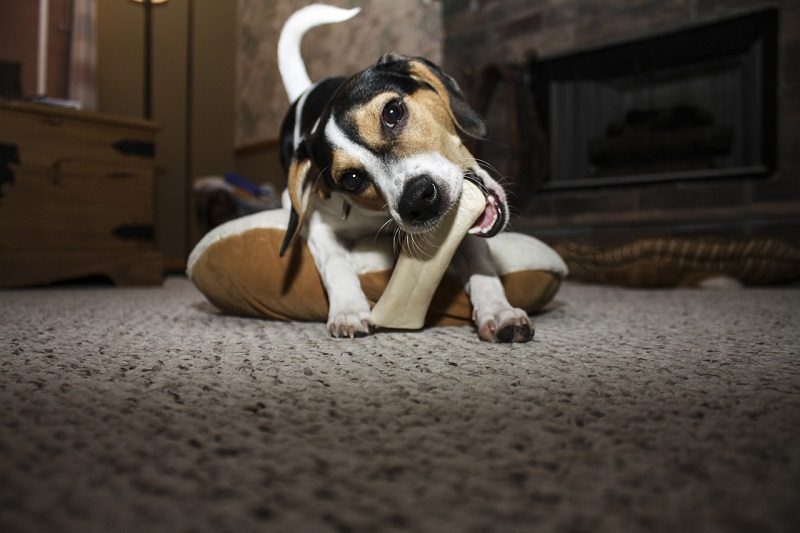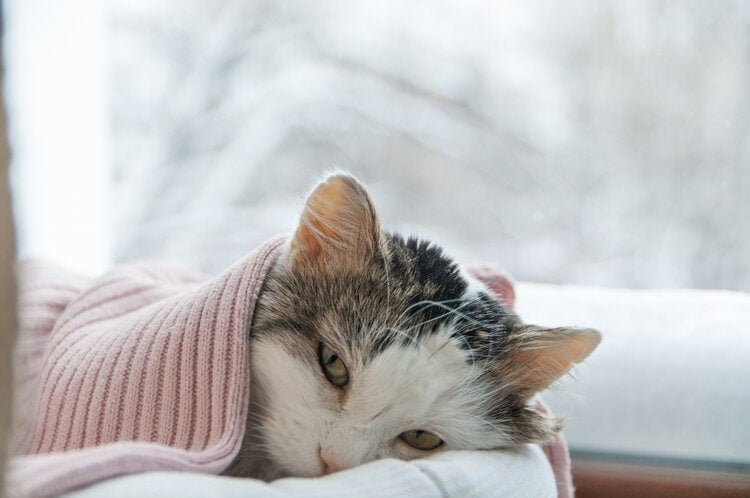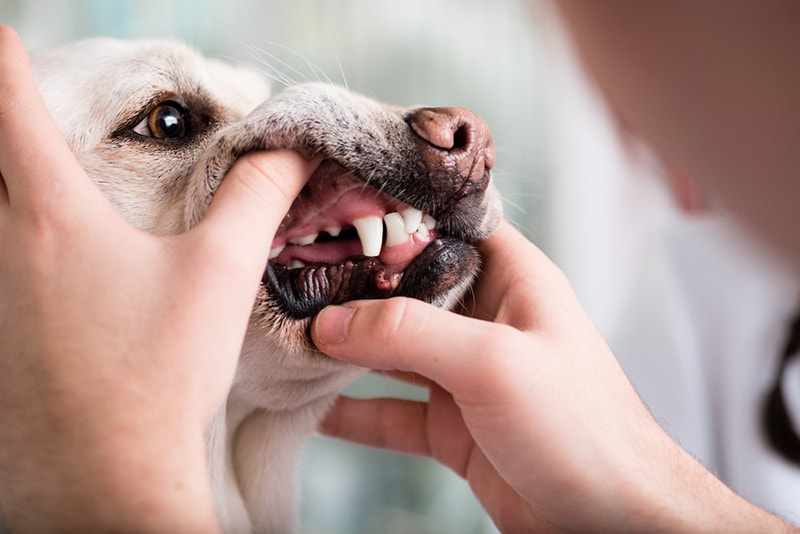My Dog Ate Cat Poop: Here’s What to Do (Vet Answer)

Updated on
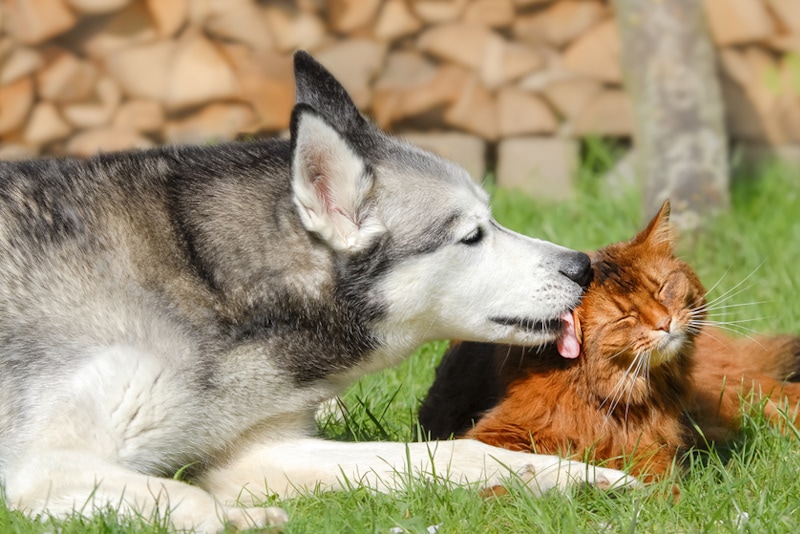
Ingestion of fecal matter, or coprophagia, is common in dogs. They may eat the feces of other animals or their own.
Many dogs that eat cat poop are healthy and do not get sick. However, cat poop is a source of bacteria and parasites, and your dog can become ill. To ensure that your dog stays healthy, even if they consume cat poop, deworm them regularly, and monitor any clinical signs that may occur (soft stools, diarrhea, vomiting, lack of appetite, etc.). If any of these appear, take your pet to the vet.
To prevent the occurrence of coprophagia, you must understand or find out the cause of this behavior. For this reason, talking to a vet is the most recommended first step because coprophagia can have several causes (boredom, stress, diet, digestive problems, internal parasites, etc.).
The 7 Possible Reasons Your Dog Ate Cat Poop
The consumption of feces can begin at any age, though it is more common in puppies. Coprophagia has mainly behavioral roots, but can also occur due to medical issues.
Dogs adopt this behavior for the following reasons.
1. Copying
This behavior in dogs is native. A mother dog will eat the feces of her puppies to keep them and the bedding clean, as well as to protect her offspring from possible predators that might be attracted by the smell.
The mother does this from the moment that the puppies are born until they are about three weeks old. The puppies are in the process of learning and developing and will imitate their mother naturally in everything she does. They can continue this behavior of copying their mother until they reach adulthood.
Even if your dogs were born and are living indoors, they may still adopt this (evolutionarily primitive) behavior, which is instinctive.
2. Digestive Issues or Nutritional Deficiencies
Nutritional deficiencies can occur when the food that your dog eats does not have enough digestible nutrients or if they are suffering from a medical condition, such as gastrointestinal parasites or malabsorption syndromes.
Switching to premium dog food can help stop this behavior. If the new food does not help your pet, an evaluation by the veterinarian is recommended.
3. Boredom, Stress, and Anxiety
Boredom, stress, and anxiety can be other causes of coprophagia. If your dog is left alone for a long time, you have just moved to a new house, or a new family member has appeared, they may develop this or other aberrant behaviors. Therefore, you should not induce more stress on your dog by punishing them when you observe this behavior.
If their food is of good quality and your dog is healthy but still develops this behavior, analyze their social and physical environment. Know that your dog needs daily exercise and quality time with family members. Consider ways to enrich their daily life and reduce their stress. With current technology, such as treat-tossing cameras, remote interactive and programmable toys, and treat dispensers, this can be done even if you are not around.

4. Exploration
Coprophagia as a learned behavior, along with natural curiosity, is what causes dogs to smell, taste, and even eat their own feces or that of other animals, including cats.
Dogs explore the environment through the senses of sight, smell, and taste. You will often see your dog taking something from the ground with their mouth to feel what it is. This can also happen in the case of cat feces, being a way to explore and discover their environment.
5. Hunger
Intestinal parasites feed on the nutrients that your dog consumes, often leaving them hungry. Therefore, your dog will try to complete their diet with anything else they can find to eat, including poop.
Dogs that do not receive enough food can also develop this behavior. If they receive insufficient meals per day, they may start eating poop. Therefore, puppies and adult dogs should receive several meals per day to stay healthy and develop harmoniously.
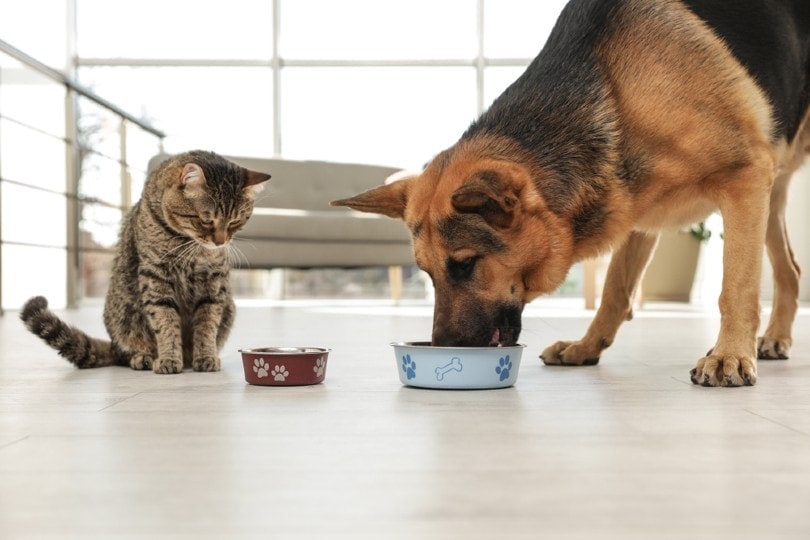
6. Appeal
It may sound gross to you, but it’s not for your dog. Cat poop can smell like cat food (and many dogs love cat food), so your dog will be tempted to eat it. Sometimes, dogs continue to eat cat poop because they like the taste. Puppies and adult dogs may continue this behavior simply because they prefer to do it.
There isn’t always a satisfactory explanation for this behavior, so the best thing that you can do to try to stop your dog from doing it is to give your cat and dog taste aversion supplements or ensure that you keep up with removing the cat’s feces from the litter box or floor before your dog gets to them.
7. Attention Seeking
Dogs may eat cat poop to get your attention because they know that when you catch them with the feces in their mouth, they will get a reaction from you (good or bad, it doesn’t matter because they perceive it as special attention). To prevent this from happening, spend more time interacting with your dog.
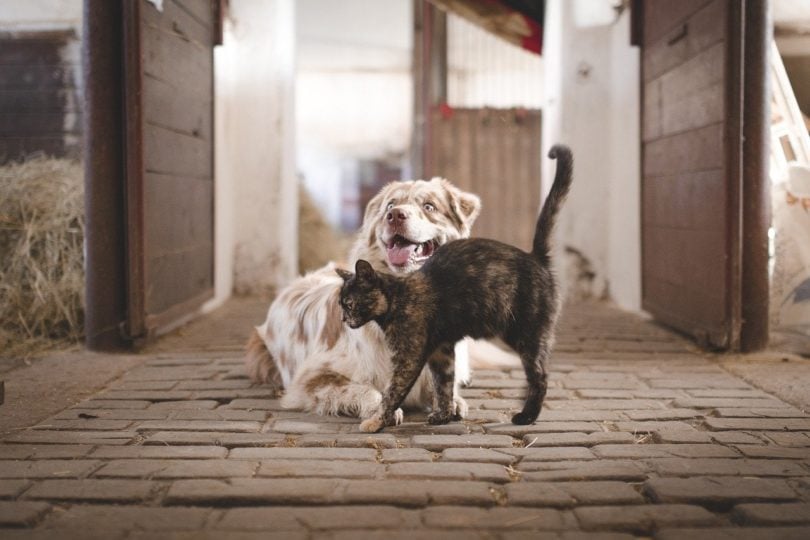
What Can Happen and What Should I Do If My Dog Eats Cat Poop?
In most cases, nothing happens when dogs eat cat poop, though their breath will likely smell after eating it. However, there are cases in which dogs get sick and develop gastrointestinal signs (vomiting, loose stools, or diarrhea). Fortunately, these are often mild and can be treated with meals of rice, vegetables, and boiled chicken.
In severe cases of continuous diarrhea and vomiting, your dog can become dehydrated, which can be life-threatening. So, if your dog has eaten cat poop and develops severe gastrointestinal signs, take them to the vet as soon as possible.In some cases, dogs may require medical treatments, and if their signs are left untreated, they will require hospitalization and intravenous fluids to recover.
It is also possible that cat poop contains intestinal parasite eggs. If your dog eats cat poop infested with parasites, they will also become infested. Parasite eggs are not always visible to the naked eye in cat poop. So, even if you do not see them in your cat’s feces, do not assume that they are not infested. For these reasons, if you know that your dog has a habit of consuming cat or another animal poop, ensure that their deworming schedule is up to date and have their fecal sample regularly checked.
How to Prevent Your Dog From Eating Cat Poop
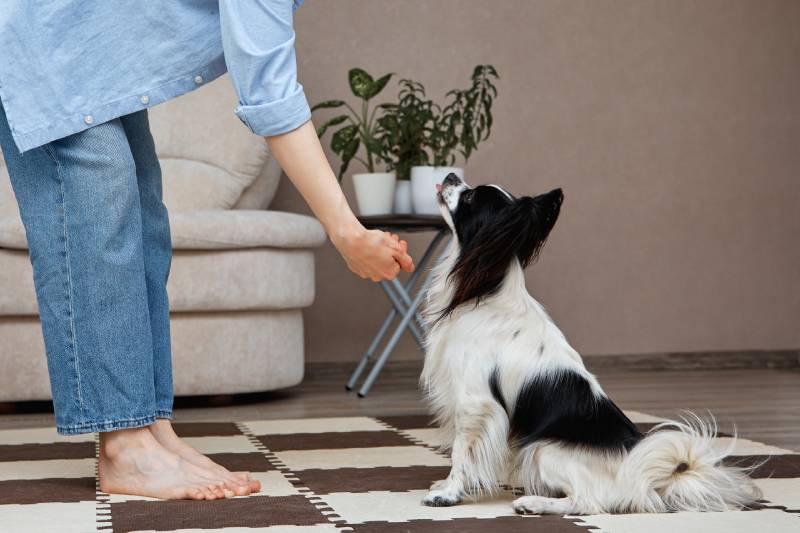
- If your dog eats poop from your cat’s litter box, the best way to prevent this behavior is to place the box in an area where your dog can no longer access it (e.g., move the litter box to another room or set up baby gates).
- If your dog eats cat poop when you take them out for a walk, wearing a muzzle will stop this unwanted behavior.
- If you have puppies that you want to give up for adoption or sell, you must clean up after them every time because otherwise, they may develop this habit, which their new owner likely won’t appreciate.
- If your dog does not consume quality food, change their diet to a premium one, rich in essential nutrients.
- For puppies, it is recommended to give them several meals a day.
- Keep up to date with deworming schedules, and have your dog’s samples regularly checked (intestinal parasites could be a cause).
- Spend quality time with your dog or get a dog sitter if you are away from home for a long time.
If your dog continues to eat cat poop despite all attempts to stop the behavior, consult a veterinarian to identify the problem.
Conclusion
If your dog exhibits this behavior, it does not mean there is something wrong with them. The causes of coprophagia are multiple and include boredom, anxiety, stress, nutrient deficiencies, or medical issues, or it’s simply because it’s appealing to them. While it is a natural behavior, it may have a few risks, though it usually does not lead to severe health problems. That said, in some cases, dogs can develop gastrointestinal disorders or become infested with parasites. It is best to try to prevent this behavior and contact your veterinarian whenever you think something is wrong with your pet.
See Also:
- 9 Best Dental Sprays for Dogs – Reviews & Top Picks
- Can Dogs Eat Scrambled Eggs? Vet Approved Nutrition Facts & Safety Guide
Featured Image Credit: Katho Menden, Shutterstock




